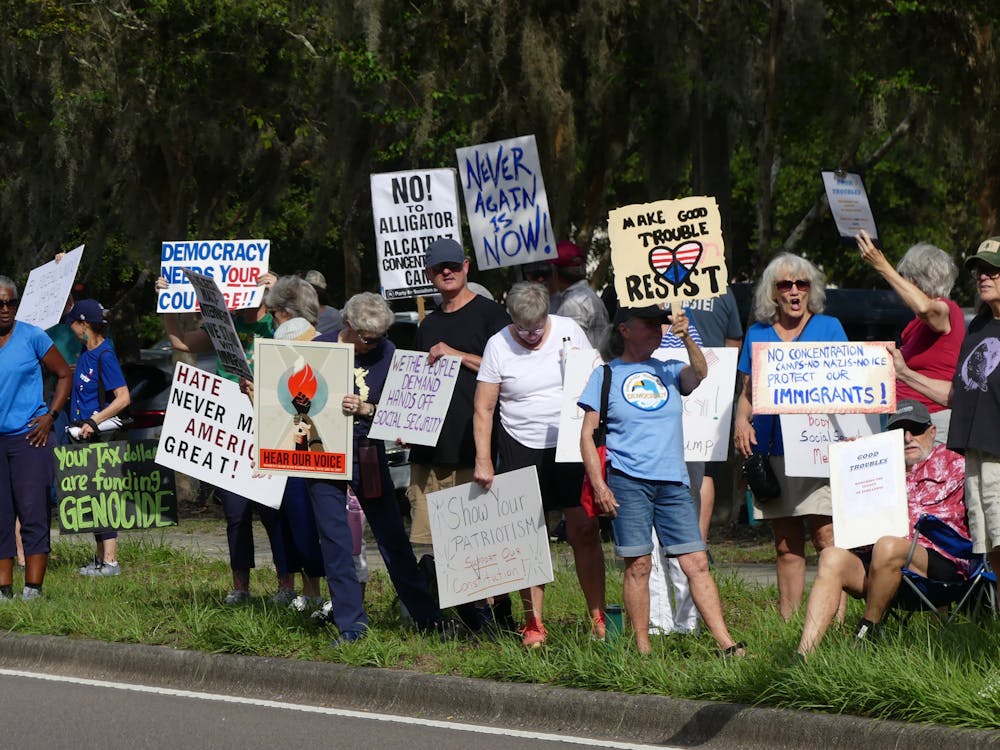Emerging from a parking lot piled with cars, people tucked signs protesting President Donald Trump’s administration underneath their armpits. They held them in the air, shouting as cars whizzed by. Some drivers honked their horns in passing, eliciting cheers from the protesters.
Around 200 community members gathered in East Gainesville’s Fred Cone Park to participate in a nationwide protest Thursday. Titled “Good Trouble Lives On,” the event was organized by the 50-50-1 movement. The local group held other major demonstrations, such as June 14’s “No Kings Day” protest.
Thursday’s protest celebrated John Lewis, a renowned civil rights activist recognized for his contributions during the 1960s Civil Rights Movement who died in 2020. He was an original Freedom Rider and a key participant in the 1965 march from Selma to Montgomery, known as “Bloody Sunday.”
Lewis became a Georgia Congressman later in his life, known for encouraging peaceful protest and civil disobedience for social justice through “good trouble.”
Protesters waved signs reading “No Kings” and “Abolish ICE.” The crowd chanted phrases like, “This is what America looks like” and “Stop Trump.”
One sign resembled a military tank, with a pinwheel affixed to the end of its cannon. “We serve no kings,” it read.
Five speakers shared their thoughts on the importance of the protest and John Lewis’ legacy.

Gwendolyn Zoharah Simmons, an 80-year-old Gainesville resident, spoke to a crowd of about 50 people. They listened to her intently with their handmade signs in hand, cheering occasionally.
Simmons met John Lewis when she was a member of the Student Non-Violent Coordinating Committee at Spelman College in Atlanta. She said Lewis was a warm and generous person who was committed to the struggle.
“He gave his life for the movement, and even as an elected official, he was still in the forefront of trying to bring about progressive change,” Simmons said. “I saw him after being beaten up many times, and he never ever shied away from being at the forefront of the demonstrations.”
To Simmons, “good trouble” means changing the country from the “segregated Jim Crow south” she grew up in, she said.
People who care about “We the people” need to run for office so they can reverse the “damage” done by the current administration, she said, including recent changes to Medicaid.
Trump’s One Big Beautiful Bill Act adds work requirements for Medicaid eligibility, including an 80-hour-per-month work requirement for able-bodied adults.
Penny, a Gainesville resident of 10 years, was one of the protest’s organizers. They said it was essential to host the event in East Gainesville because it's a side of town not typically involved in local demonstrations.
“We wanted to bring the people,” Penny said. “The east side tends to be forgotten, tends to be underserved. We wanted to bring it here, specifically for the east side community.”
The Alachua County Labor Coalition, National Women’s Liberation and Party for Socialism and Liberation tabled at the event. The organizations were invited because they value 50-50-1’s focus on non-violence, inclusivity and conflict resolution, she said.
“We want to make this about the people, not about throwing a party,” Penny said. “We want to make this for the people, by the people.”
Ginny Rose, a 78-year-old Gainesville resident, has attended protests since the Trump administration’s second term. She’s concerned about the changes that will occur to programs like SNAP through the Beautiful Big Bill, she said.
“Poor people have it bad already, and instead of getting better, they’re taking more things away,” Ginny said.
The frequency of demonstrations makes her hopeful, but she’s worried people aren’t listening to activists’ messages, she said.

Her husband, Eddie Rose, a 74-year-old Gainesville resident, said the protest is how he and his community do their part in “getting rid” of the current administration.
The administration's immigration policies are one of the issues he finds alarming.
“Been here for years, picking our vegetables, serving our food, and now they’re criminalizing all of them in a blanket thing,” Eddie said. “It’s inhumane, putting them in concentration camps that we’re paying for.”
Eddie also participated to criticize U.S. Representative Kat Cammack, who represents Gainesville. She is “absolutely worthless” and does not fairly represent her constituents, he said.
“I can’t even get an audience with her,” Eddie said.
He tried multiple times by calling and leaving messages, he said. After his third attempt to leave Cammack an email, he was directed to an appointment secretary.
Kyrylo Sokolov, an 18-year-old UF physics freshman, rode his bike from UF’s campus to partake in the protest. He recently moved to Gainesville as he prepares to begin classes in the fall.
Sokolov said “good trouble” means going against the status quo, like opting for bike transportation instead of a car.
“Good trouble should be more than going to protest,” Sokolov said. “Any person that wants to be in America should be allowed to be here.”
He found the protest through Reddit and plans to attend as many as he can. He feels he has more of a voice in Gainesville than in his hometown of Tampa. The protest prompted him to consider becoming politically active on a local level, he said.

Joshua Rivera, a 19-year-old UF entomology sophomore, said although UF’s main campus is about six miles from the park, he found it surprising there were few young people at the protest.
“I could count them on one hand,” Rivera said. “There needs to be a new energy injected into what’s happening.”
About halfway into the protest, dark clouds rolled into the area. Thunder rumbled, and the park’s lightning alarm sounded. As the sirens blared, protesters began to scatter to the safety of their homes.
Rivera, who arrived at the protest after the clouds cleared, picked up a pile of free signs on the floor. He and another participant stayed behind after the protest ended to clean up.
“I figured it might be nice to be able to look back and know that I did what I could, which in the grand scheme of things [is] not really anything,” Rivera said. “But doing it anyway, I find it rewarding.”
Pierce Butler, a 71-year-old Gainesville resident, helped supply signs for the protest. He’s familiar with making his voice heard, having participated in anti-war protests during the Vietnam War, he said.
Butler held a sign reading “Orange Lies Matter.” The words, in orange lettering, had a blonde curl painted over the top of the “O.”
“The people in power are moving faster, and with a lot more rule-breaking, than the ones of us who’ve been citizens for a long time are even ready to imagine,” Butler said.
Individuals can always do something to protest, he said, from confiding in others to hanging signs in their yard or windows.
Protests should continue until politicians start to realize the public is angry, he added, noting that he hasn’t seen recent progress in civil rights issues, health care or the climate.
“I would rather be lying around at home drinking lemonade and reading science fiction,” Butler said. “But life isn’t working out that way for me. Been out there, protesting or counter-protesting, as the case may be, most of my life. That’s going to be the story of my life.”
Contact Alanna Robbert at arobbert@alligator.org. Follow her on X @alannafitzr.

Alanna is a journalism senior and the Fall 2025 data reporter for The Alligator's Enterprise desk. She was previously a general assignment reporter for metro. Outside of reporting, she is found either with a book, in the gym or with friends playing pool.






